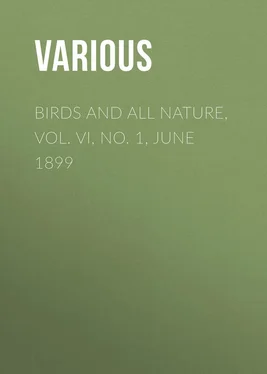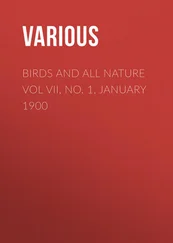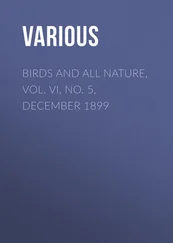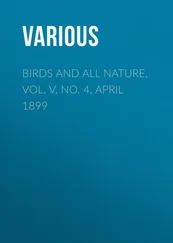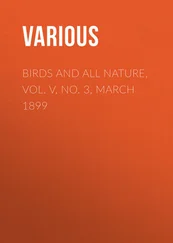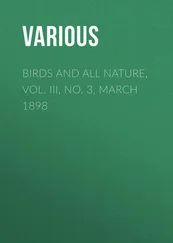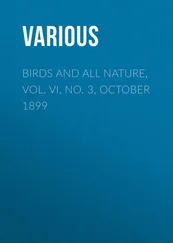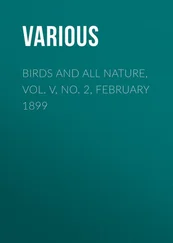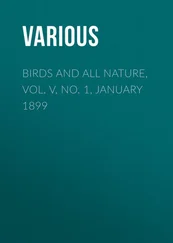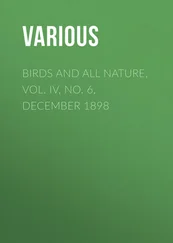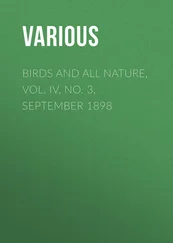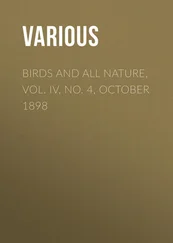Various - Birds and All Nature, Vol. VI, No. 1, June 1899
Здесь есть возможность читать онлайн «Various - Birds and All Nature, Vol. VI, No. 1, June 1899» — ознакомительный отрывок электронной книги совершенно бесплатно, а после прочтения отрывка купить полную версию. В некоторых случаях можно слушать аудио, скачать через торрент в формате fb2 и присутствует краткое содержание. Жанр: periodic, Биология, Природа и животные, foreign_edu, на английском языке. Описание произведения, (предисловие) а так же отзывы посетителей доступны на портале библиотеки ЛибКат.
- Название:Birds and All Nature, Vol. VI, No. 1, June 1899
- Автор:
- Жанр:
- Год:неизвестен
- ISBN:нет данных
- Рейтинг книги:5 / 5. Голосов: 1
-
Избранное:Добавить в избранное
- Отзывы:
-
Ваша оценка:
- 100
- 1
- 2
- 3
- 4
- 5
Birds and All Nature, Vol. VI, No. 1, June 1899: краткое содержание, описание и аннотация
Предлагаем к чтению аннотацию, описание, краткое содержание или предисловие (зависит от того, что написал сам автор книги «Birds and All Nature, Vol. VI, No. 1, June 1899»). Если вы не нашли необходимую информацию о книге — напишите в комментариях, мы постараемся отыскать её.
Birds and All Nature, Vol. VI, No. 1, June 1899 — читать онлайн ознакомительный отрывок
Ниже представлен текст книги, разбитый по страницам. Система сохранения места последней прочитанной страницы, позволяет с удобством читать онлайн бесплатно книгу «Birds and All Nature, Vol. VI, No. 1, June 1899», без необходимости каждый раз заново искать на чём Вы остановились. Поставьте закладку, и сможете в любой момент перейти на страницу, на которой закончили чтение.
Интервал:
Закладка:
Various
Birds and All Nature, Vol. VI, No. 1, June 1899 Illustrated by Color Photography
MY NEIGHBOR IN THE APPLE TREE
TROPICAL portions of the American continent, rich in an endless variety and beauty of bird-life, have shared with New England but a single species of Trochilidæ, Trochilus colubris , the ruby-throated humming bird.
This "glittering fragment of a rainbow" adds a decorative feature to our gardens, its nest so protected through diminutive size and perfect adaptation to the surroundings that it rarely comes under one's observation.
It is commonly asserted that the male is an arrant shirk, that he leaves the entire labor of building and furnishing the house as well as the heavy duties of housekeeping to the faithful mother, being in the fullest sense a silent partner either from choice or otherwise, a mere apology for a husband and head of a family.
Nor does he redeem himself when the prospective "twins" arrive and slender bills are lifted appealingly for food! No thanks to him that the naked, squirming little atoms replacing the two white eggs become gradually stronger, that some hint of plumage duly covers their nudeness, or that bye-and-bye they become birds in reality.
Two years ago this "little lady in green" made her nest upon an apple tree branch, concealing it so deftly that the gardener at work near by was unaware of the distinguished guests until the brooding was nearly over. When the little birds had flown the lichened residence, becoming a family possession, was considered the daintiest souvenir of the summer.
Being anxious to know if this rare, interesting episode would be repeated, the following summer I watched carefully for its repetition. Promptly in June I found that a humming bird was again "at home," this time upon a horizontal maple branch, twelve feet from the ground and directly over the sidewalk. This nest was soldered upon a long slender bough half an inch in thickness at the intersection of another, a mere twig a quarter of an inch through, the latter inwrought with, and concealed for a full inch in the structural fiber. Upon the 22d of the same month, by the aid of a ladder I found that two eggs "the size of yellow beans" were lying inside the downy cup shaped nest. Before this luckless visitation the tail of the brooding bird could be seen from the ground, but during the next two days there was no sign of life thereabout.
In the afternoon of the third day my bird was in the maple, darting hither and thither like a swallow, plunging into the insect swarms and securing several before they realized her presence. Then she came to the honeysuckle beside me, hovering over it in a bewildered, irresolute manner as if debating whether she could safely probe its scarlet cups. Just at this moment a big miller flew by and off she went in close chase, capturing it upon the wing. Then she rested upon a maple twig, leisurely preened her feathers, drawing each one gently through her beak, and after a second visit to the honeysuckles darted toward the nest. Now, I thought, is the time, if ever, to decide if she is still housekeeping, and following quickly, I saw her standing upon the edge of the silken cradle. Her head moved rapidly from side to side as she regarded its contents, after which she rose lightly in the air, dropped upon the nest with the airy grace of a thistledown, and spread above it the feathered blanket of her soft, warm breast. For several minutes she ignored my presence, drawing her beak across the leaves or springing into the air for a passing insect which was captured and apparently given to her family. Once I detected a "squeak," and her head was instantly thrown to one side in a listening attitude. If it was the note of the mate he did not approach the nest, the thick leaves hiding the tree-top from which the sound proceeded.
There was a furious wind that night and the warm days were followed by a sudden fall in temperature.
From that time the nest was deserted; I could only conjecture that I had presumed too much upon her defenselessness, or, that the young, if young there were, were dislodged by the wind. This abandoned homestead was as round and perfect as a new coin just issued from nature's mint, a marvel of elegance in which all the instinctive gifts of decorative art united.
There were no visible signs of rebuilding during the twelve days that followed; casual trips to the honeysuckle, hovering over the flowers like some gorgeous insect with colors scintillating in the full sunshine, alone gave evidence of further interest or intention.
Upon the thirteenth day there was a marked change. Again she flew excitedly about the lawn, stopping abruptly to wheel about and dart off in an opposite direction, a vitalized complement of the spirit of the trees, mingling with and pervading the garden as freely as did the light and air. She threw herself against a summer warbler almost knocking him off his perch and, not content with this treatment, drew him from the lawn, which, by the way, was his own harvest field where he had gleaned diligently for several days.
Then the bird poised before me in mid-air, circled about my head before plunging into an apple tree in whose leafy mazes she disappeared. Just at that moment an accommodating breeze displaced the leaves; there was a flutter within, a flash of wings, an unusual agitation that told of something quite beyond the ordinary. As the breeze died away the leaves resumed their place thus preventing all further inspection. From the parlor windows, fortunately, there was less obstruction, – she was still twisting about, going and returning, dropping within the foliage and going through the most singular antics.
An opera-glass revealed the meaning; she dropped into a half-finished nest that had all this time been directly in range of vision. The tiny tenement was so deftly concealed, blending in color and apparent texture with the bough that held it, and so sheltered by overhanging leaves that it was still difficult to locate a second time.
With unbounded delight I watched her come and go a dozen times in less than that number of minutes, bringing at each arrival a quantity of vegetable fiber soft as a silken cobweb, adjusted invariably while standing inside the nest and turning completely around several times as if shaping the interior to her better satisfaction. She reached far over and pulled the fluffy cotton into place, beating it here and jerking it there, sinking her little breast into and shaping it to fit the soft contours of her body; or, covering the outside with trailing wings, beat them rapidly against the felted foundation which at these times was entirely hidden beneath their iridescence. Though still unfinished the delicate structure was lichen-decorated, simply perfect so far as it went, in this case defying the assertion that humming birds' nests are always completed before this ornate decoration is added.
After working rapidly for two full hours she paused to rest upon a dead twig, opening and closing her wings in the twinkling fashion of a bluebird, an exercise prefacing a breakfast taken in the nearest tree as she poised beneath the leaves.
With appetite appeased she dropped upon the unfinished cradle and sat so still for twenty minutes that I was certain an egg was deposited. Doubtless the misfortunes attending previous nesting had interrupted the even tenor of life, the second housekeeping was more urgent than was anticipated.
For ten minutes more her form was motionless though her head moved from side to side in a ceaseless surveillance – a warbler lunching in the next tree glanced casually in her direction, and was evidently just wild with curiosity.
The situation was too much for him; he left his post hurriedly, flew over her and looked down, flew under and looked up, peered at her from an airy poise, still undecided as to who was rocking in that wonderful cradle. Craning his neck he hopped along the branch till he stood beside her, so near that his yellow coat literally brushed her garments, his attitude a quick pantomime of his thoughts, half paralyzed with questioning surprise as to what this remnant of a bird might be, not by any means to be bought cheap because it was a remnant.
Читать дальшеИнтервал:
Закладка:
Похожие книги на «Birds and All Nature, Vol. VI, No. 1, June 1899»
Представляем Вашему вниманию похожие книги на «Birds and All Nature, Vol. VI, No. 1, June 1899» списком для выбора. Мы отобрали схожую по названию и смыслу литературу в надежде предоставить читателям больше вариантов отыскать новые, интересные, ещё непрочитанные произведения.
Обсуждение, отзывы о книге «Birds and All Nature, Vol. VI, No. 1, June 1899» и просто собственные мнения читателей. Оставьте ваши комментарии, напишите, что Вы думаете о произведении, его смысле или главных героях. Укажите что конкретно понравилось, а что нет, и почему Вы так считаете.
